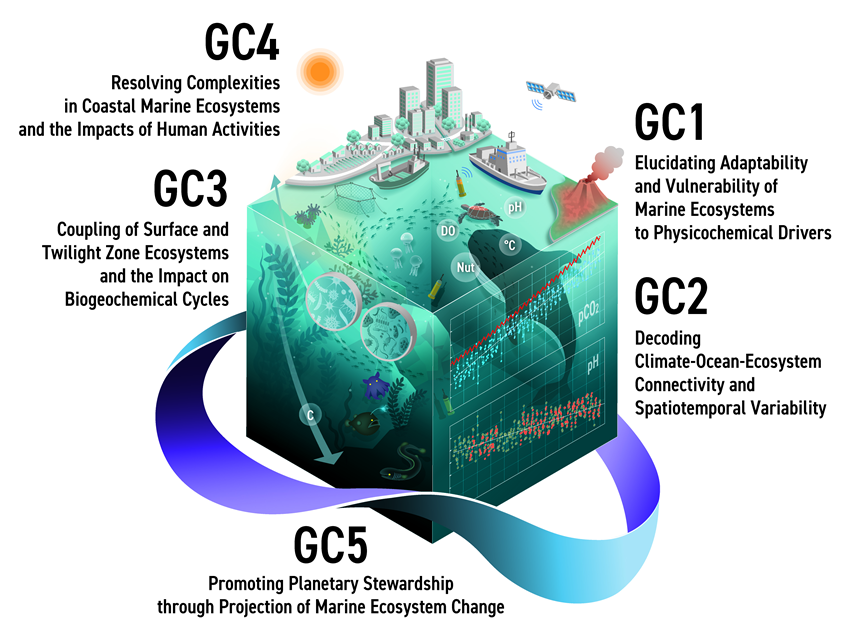News
News
2025.8.22
WPI-AIMEC Formulates “Grand Challenges”

WPI-AIMEC researchers have meticulously deliberated and formulated five “Grand Challenges” that will steer their research on understanding and forecasting marine ecosystem change. Here, “Grand Challenges” refer to overarching, significant, yet still poorly understood mechanisms driving marine ecosystem change. WPI-AIMEC will explore these Grand Challenges through cutting-edge fusion science and international brain-circulation, aiming to deliver transformative science and actionable projections for stakeholders, thereby advancing planetary stewardship towards a sustainable ocean, Earth, and human society.
The first Grand Challenge seeks to understand the adaptability and vulnerability of marine ecosystems. How does marine life, from microbes to megafauna, respond to stressors like warming, acidification and nutrient imbalances? Addressing this challenge will help conserve biodiversity, protect coastal communities and inform nature-positive decision-making for a sustainable future.
The second Grand Challenge aims to decode Climate-Ocean-Ecosystem connectivity. Changes in climate patterns or ocean currents can trigger a regime shift, a sudden or significant change from one stable ecosystem to another. But the links between physical and ecological processes remain unclear. By understanding these, WPI-AIMEC will detect regime shifts sooner and help prepare for their impacts.
The third Grand Challenge explores interactions between the surface and the twilight zone, 200 and 1000 meters below the surface. This layer is crucial for moving nutrients and carbon, but little is known about how it connects with surface ecosystems. Using Biogeochemical (BGC) Argo floats and ship-based sampling, WPI-AIMEC will track nutrient flow. This information could have wide-reaching effects on global fisheries, carbon storage, and climate regulation.
The fourth Grand Challenge tries to unravel the complexities of coastal marine ecosystems and the impacts of human activities. WPI-AIMEC will monitor ecosystem changes from the coast to the open ocean, using model sites such as Onagawa Bay and Mutsu Bay to measure nutrient cycling, carbon storage, and fisheries support. These insights will be instrumental for informing better coastal resource management and protection.
Finally, the fifth Grand Challenge focuses on planetary stewardship. Predicting marine ecosystem change is crucial but turning that knowledge into actionable insights is just as important. By working closely with industries, local government, and the public from the start, WPI-AIMEC will ensure its research is relevant, credible, and can drive real-world action.
Although these Grand Challenges are broad and complex, they provide an initial roadmap for WPI-AIMEC’s ambitious mission. They guide research on understanding and predicting marine ecosystem change while linking scientific knowledge with societal needs. As research progresses, this roadmap will be reviewed and refined to keep efforts on track. Through these efforts, WPI-AIMEC aims to support a resilient ocean and a healthy planet for generations to come.
Nature article
https://www.nature.com/articles/d42473-025-00185-9
Grand Challenges Executive Summary: [EarthArXiv link]
https://doi.org/10.31223/X55R0J

